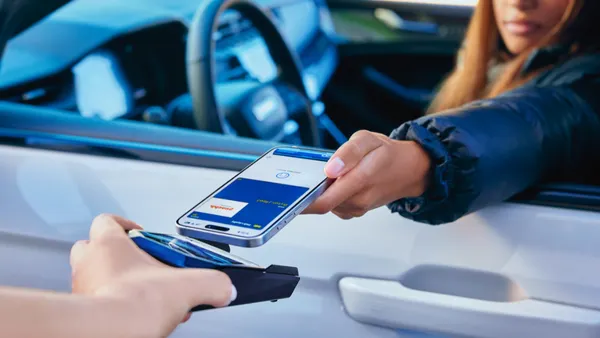Dive Brief:
- Nekter Juice Bar and Portillo’s Hot Dogs are the first brands to participate in BMW's in-car ordering pilot, which is a partnership with food ordering platform Olo, according to a company press release. The service is available for BMW models from 2015 and newer.
- BMW owners can send orders to restaurant locations across the U.S. directly from their cars after visiting the BMW Labs website.
- Users can pre-configure their favorite orders while paying with the push of a button. They're also provided with driving directions to pick up their orders.
Dive Insight:
By partnering with BMW, Nekter and Portillo's are leveraging the luxury car brand's reputation to give themselves a boost against the larger restaurants already offering in-car ordering.
In 2017, GM launched in in-car ordering platform called GM Marketplace that allowed users to order from Starbucks, Dunkin', Wingstop and other brands. Earlier this year, Domino's Pizza partnered with Xevo, a provider of in-vehicle commerce and services for automakers, to launch the AnyWare pizza ordering platform. Chipotle is considering in-car ordering capabilities as well.
The time may be ripe to get into in-car ordering. Between October 2018 and March 2019, the average American saw a 12% increase in the amount of time they spend in the car, creating greater opportunity for retailers to target drivers with convenience-focused offerings while they're on the go. Ordering through a car’s dashboard platform may also be safer compared to using a smartphone behind the wheel to order food through an app or phone.
Portillo's is no stranger to digital ordering. It was one of the first brands to be part of Olo's pilot with Google to integrate ordering capabilities within Google Search, Maps and Google Assistant, and is fine-tuning mobile order-ahead for group catering and individual orders. These capabilities can help regional brands compete with national chains that have been offering in-car ordering and other digital ordering platforms for several years.
With digital orders growing at a double-digit pace over the past four years, now representing 3% of the $863 billion restaurant industry, and convenience weighing heavily in consumer decisions, recent innovations such as in-car ordering and dedicated pickup lanes seem like a natural progression.
Whether consumers will tire of limited offerings through in-car ordering platforms will be an interesting factor to follow as it expands. The novelty of placing orders through a car's touchscreen could wear off if it only features a few restaurant options, for example. At the same time, the additional touch point with consumers could help restaurants get more digital sales.








